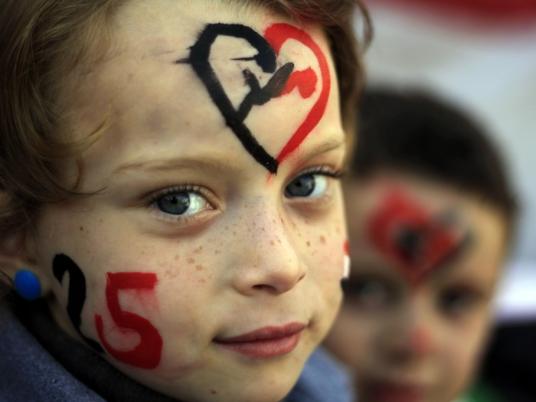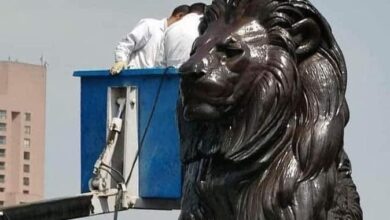
Prayers and protests dominate Sunday’s front pages as on the anniversary of the Day of Anger — the most violent of the 18 days preceding Mubarak’s ouster — Egyptians gathered to commemorate those martyred by Central Security Forces.
On Saturday “thousands of protestors performed afternoon prayers on Qasr al-Nil bridge” — one of the major confrontation scenes between police and protestors during last year’s uprising — “as well as the Salat al-Ghaeb, or prayer of the absent, in honor of the martyrs,” independent papers Al-Wafd, Al-Shorouk, Al-Dostour and Al-Tahrir report. The latter emphasizes that the prayers were book-ended by extensive chanting accusing both the Supreme Council of the Armed Forces (SCAF) and the Muslim Brotherhood of subverting the revolution.
Al-Tahrir reports that immediately after the Qasr el-Nil prayers, a group of protestors marched to the Egyptian state TV building, Maspero, calling for purging the media of corruption and accusing all state media personnel of being “liars” and “drunkards,” apparently. Further details of the protestors’ chants can be found on Al-Tahrir’s front page.
Although featured on Al-Ahram’s front page, the Qasr al-Nil protest is relegated to a single paragraph of broad details, in favor of what the state-owned paper describes as an “extremely intriguing development”: the SCAF assigning its Advisory Committee to “present a list of specific suggestions regarding the remaining transitional period, with the stipulation that these suggestions be based on relevant studies.” The committee’s homework assignment is due on Tuesday.
The report goes on to describe at length the SCAF’s desire for a peaceful transition, and other bits of non-news.
Scheduled for Tuesday is a mass protest calling for “the formation of a fact-finding committee to look into the killing of protestors,” according to Al-Shorouk. The protestors will also demand an immediate transition of power, and a guarantee that the SCAF will not enjoy a “safe exit” but instead face trial for “mutilating the revolution and the revolutionaries,” among other crimes. Organized by 36 separate political parties and activist groups, the protest is to express participants’ fear of “a constitution written under military rule,” and its implications. The protest will be held outside Parliament.
Meanwhile, the Brotherhood has issued a series of “warnings concerning what they describe as a hate campaign launched against the organization by most media outlets,” reports Al-Dostour. In a public statement, the Brotherhood defended its role in the revolution, claiming to have played an essential part in the supposed downfall of the regime.
“We drove the revolution and paved the way for its success through years of continuous protests against Emergency Law, military trials, constitutional amendments, nepotism… We have sacrificed thousands of our young people and sheikhs to the beliefs [that led to] 25 January,” the statement read, before asserting the Brotherhood's presence in Tahrir “since day one.”
It went on to warn of the consequences of the hate campaign allegedly being carried out against it, claiming it could result in “a repeat of the events of Mohamed Mahmoud Street or the clashes outside of the cabinet headquarters” — two of the most violent episodes in recent history.
The Brotherhood’s statement is a response to mounting accusations that it has made clandestine deals with the SCAF, and follows minor clashes between its representatives in Tahrir and members of secular revolutionary groups.
Meanwhile courtroom antics continue in the trials for former regime heavyweights. In the latest episode Mohamed al-Guindy, lawyer for ex-interior minister Habib al-Adly, claimed that his client could not have possibly been against the revolution, since he helped “protect” it, the evidence being that on 28 January 2011 a police officer escorted Mohamed ElBaradei home instead of murdering him.
In Al-Dostour and Al-Shorouk, Guindy recounts how, on the aforementioned date, ElBaradei performed Friday prayers in the company of a police escort, and then attempted to join the growing protest before being led home (ie. leaving a public scene in the presence of the police escort) for his own safety. “If there was any intention to eliminate protestors, than it would have been prudent to immediately assassinate the symbolic figures of the revolution, such as ElBaradei, Wael Ghoneim, and members of the Muslim Brotherhood,” Guindy argued, in an attempt to redefine heroism as having an enemy who is too high-profile to kill. Reports that Guindy was laughed out of the courtroom have yet to be confirmed.
Presumably for an encore, Minister of Justice Adel Abdel Hamid has issued a statement claiming that the “trials against those who killed protestors are taking their natural course,” according to Al-Dostour. Abdel Hamid went on to vow that “the blood of the martyrs will not be in vain, their rights will be restored.”
Finally, Shura Council elections are set to begin on Sunday, as duly noted in a few sidebars. The first stage, lasting two days, will be held in 13 of the nation’s governorates, including Cairo, Alexandria, Assiut, Fayoum, North and South Sinai, and the New Valley. According to Al-Shorouk, there are over 25 million registered voters in the first stage governorates.
Egypt's papers:
Al-Ahram: Daily, state-run, largest distribution in Egypt




